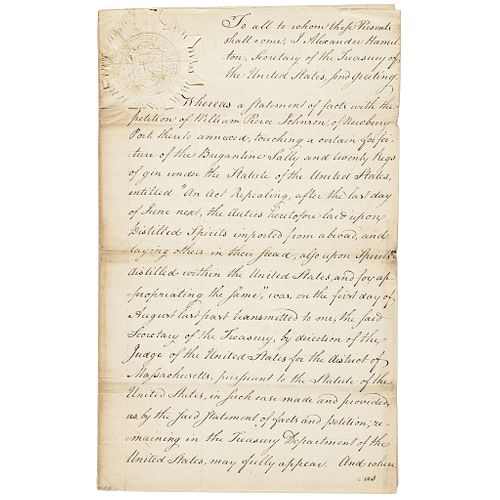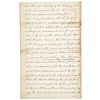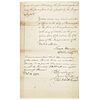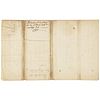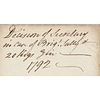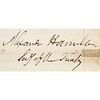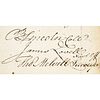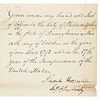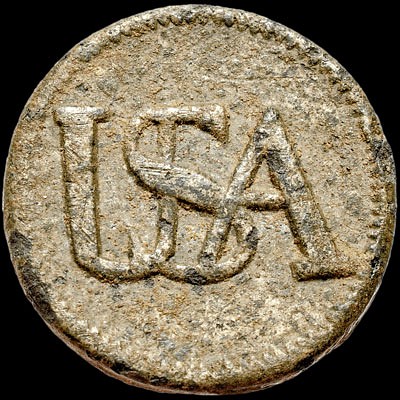Alexander Hamilton Signed 1792 Summary Judgment Regarding Tax on 20 Kegs of Gin
Lot 14
About Seller
Early American History Auctions
1520 Commerce St., #312
Winchester, VA 22601
United States
Estimate:
$10,000 - $15,000
Absentee vs Live bid
Two ways to bid:
- Leave a max absentee bid and the platform will bid on your behalf up to your maximum bid during the live auction.
- Bid live during the auction and your bids will be submitted real-time to the auctioneer.
Bid Increments
| Price | Bid Increment |
|---|---|
| $0 | $10 |
| $200 | $20 |
| $300 | $25 |
| $500 | $50 |
| $1,000 | $100 |
| $2,000 | $200 |
| $3,000 | $250 |
| $5,000 | $500 |
| $10,000 | $1,000 |
| $20,000 | $2,000 |
| $30,000 | $2,500 |
| $50,000 | $5,000 |
| $100,000 | $10,000 |
| $200,000 | $20,000 |
| $300,000 | $25,000 |
| $500,000 | $50,000 |
About Auction
By Early American History Auctions
Aug 21, 2021
Set Reminder
2021-08-21 12:00:00
2021-08-21 12:00:00
America/New_York
Bidsquare
Bidsquare : Autographs - Historic & Political Americana - Militaria & Guns
https://www.bidsquare.com/auctions/early-american-history-auctions/autographs---historic-political-americana---militaria-guns-7321
335 Lots of Rare, Historic Autographs, Americana, Civil War Era, George Washington, Revolutionary War Era, Colonial America, Federal Period, War of 1812, Colonial Currency & more... Early American History Auctions auctions@earlyamerican.com
335 Lots of Rare, Historic Autographs, Americana, Civil War Era, George Washington, Revolutionary War Era, Colonial America, Federal Period, War of 1812, Colonial Currency & more... Early American History Auctions auctions@earlyamerican.com
- Lot Description
Autographs
1792 Alexander Hamilton Signed "Summary Judgment" Order
as United States Treasury Secretary
Demonstrating Hamilton's Unique Authority and Position Deciding a Contentious Tax Collection Matter as the First Federal Taxes and the Tax Gathering System Were Established Under the New U.S. Constitution
A Tax Case Involving on "Gin" Demonstrating The Uniqueness and Special Authority Granted to Alexander Hamilton
Also Signed by Three Historical Figures as the Port of Boston Customs Agents:
General Benjamin Lincoln, Collector; James Lovell, Naval Officer; & Thomas Melville, Surveyor
ALEXANDER HAMILTON (January 11, 1757 - July 12, 1804). A Founding Father of the United States, Revolutionary War Soldier, Economist, Political Philosopher, one of America's first Constitutional Lawyers, and the First United States Secretary of the Treasury under President George Washington, Killed in his famous Duel with Aaron Burr.
October 18, 1792-Dated Federal Period, Manuscript Document nicely Signed, "Alexandr Hamilton - Secr of the Treasy" as Secretary of the Treasury, Summary Judgment, 3 pages, measuring 12.5" x 8", Very Fine. In this historic official Document, Alexander Hamilton as the United States Secretary of the Treasury, Signs an important "Summary Judgment" thus Demonstrating Hamilton's Unique Authority of Position in deciding contentious Tax Collection matters as the First Federal Taxes and the Tax Gathering System were then Established, under the New United States Constitution.
The subject of this case decision of October 18th, 1792 in its "Summary Judgment" involved 20 Kegs of Gin. The liquor had been illegally transported on the Brigantine Sally, but perhaps shipped unintentionally in their "illegal" condition. Alexander Hamilton's summarily agreed with the petitioner, Newburyport's William Pierce Johnson, and their position was agreed upon by the Three Boston Port Inspectors involved, each of whom also Sign on December 24, 1792. At the conclusion of this Document are the Signatures of: Benjamin Lincoln, Collector (1789-1809); James Lovell, Naval Officer (1778-1789); and Thomas Melville, Surveyor (1751-1832). Their signed statement in testimoney reading, in full:
"From a conviction that the importer of the above Spirits had no intention thereby to defraud the revenue we submit to Jeremiah Elliot all our right & interest therein - (Dated) Dec 24 1792 - (Signed) "B: Lincoln Collr"; "James Lovell Navl. Off."; "Tho Melvill Surveyor".
Alexander Hamilton's Autographed, handwritten personal comments, are interlined on page 3, reading in full:
"Given under my hand and Seal of Office in the City of Philadelphia, in the State of Pennsylvania this 18th. day of October, in the year of our Lord 1792. and in the 17th. year of the Independence of the United States. - (Signed) Alexandr Hamilton Secr of the Treasy"
The original Embossed Paper Seal remains fully intact in the upper left corner of the front page, beautifully penned in brown ink on proper wove period paper. Several early archival fiber tape reinforcements, the largest one runs vertically along the inside central page fold and rejoins the separated leaves and blends quite well. Apart from some toning, small reinforcements of folds (one located to the right of the signature) and some trivial marginal chipping, this is an impressive well written and easily readable document. Alexander Hamilton's signature sits just above the central horizontal fold of the third page, is boldly written in brown ink and is excellent. Docket on the final blank fourth page reads, in full: "Decision of Secretary in Case of Brigt. Sally & 20 Kegs Gin - 1792".
The new United States Constitution officially went into effect and first President George Washington appointed Alexander Hamilton as the new nation's first Secretary of the Treasury on September 11, 1789. The First Federal Congress then faced the mammoth task of devising a fair and acceptable Federal Taxation System, the most important new power granted to the Federal government under the new U.S. Constitution. When the new Congress then located in Federal Hall in New York City proved incapable of making progress on the long standing and complicated Revolutionary War era State and Federal debt issues involved, at the end of their First Session they charged the newly appointed Treasury Secretary, Hamilton, to prepare a plan to restore the Public Credit of the United States.
Hamilton at once sprang into an impassioned and single-minded effort to produce this massive financing plan. He submitted his critically important, historic 40,000 word Public Credit Plan to the House of Representatives on January 6, 1790. Besides the politicking necessary to get his plan passed Hamilton and his allies worked constantly behind the scenes to assemble the necessary import/export data from the many ports of the US so that he could project potential tax rates on various goods needed to build a fair and acceptable taxation system, the revenues from which covered the new nations current operating and revolutionary war debt interest costs.
Hamilton's Plan passed into law in stages, and at each stage Hamilton molded his Plan into an increasingly efficient Tax Revenue and Collection system. Along the way he orchestrated his Revolutionary War State Debt Assumption Plan into his system by achieving a historic compromise, including the legislative agreement to move the Capitol of the United States from Philadelphia, after 10 years, to a new permanent residence on the Potomac (Washington DC).
The new nation was fortunate to have such a creative and knowledgeable new Secretary of the Treasury such as Alexander Hamilton to be at the top of the Treasury's authority chain. Hamilton's authority was further augmented by Congress by its adaptation of Section 43 of the March 3, 1791 "U.S. Distilled Spirits" Act, which granted Secretary Hamilton "Summary Judgment" powers to make decisions in contentious federal Tax related issues.
Collectors having acquired even a single original "Alexander Hamilton" Signed Document is a wonderful achievement. Acquiring his signature on a important Document with an official United States Treasury Seal that you can hold right in your hand, that also directly represents Hamilton's unique new authority as Secretary of the Treasury, is a compelling concept that should significantly motivate bidders. Few observers are aware that by 1792 over 90% of the Federal Government worked for Alexander Hamilton, who personally schooled and oversaw many of them with the instructions and fine details required of properly executing their new profession in benefit of the American people. This Alexander Hamilton document is hardly perfunctory or routine. It is graced with three additional historically important American Revolutionary War signatures, and demonstrates the substantial power granted to our First Secretary of the Treasury. An original important, historically significant fiscal document regarding the founding powers of the Treasury of the United States.
Port of Boston Customs Officials as Signatories: Benjamin Lincoln, Collector (1789-1809); James Lovell, Naval Officer (1778-1789); and Thomas Melville, Surveyor (1751-1832).
General Benjamin Lincoln, Collector; Benjamin Lincoln, (born Jan. 24, 1733, Hingham, Mass.-died May 9, 1810, Boston), Continental army officer in the American Revolution who rendered distinguished service in the northern campaigns early in the war, but was forced to surrender with about 7,000 troops at Charleston, S.C., May 12, 1780.
A small-town farmer, Lincoln held local offices and was a member of the Massachusetts militia since the French and Indian War (1755-76). In May 1776 during the Revolutionary War he was appointed Major General in the Continental Army, and in 1778 was placed in command of Continental forces in the South. He was widely criticized for the Charleston defeat, although no formal action was taken against him. Released in a prisoner exchange, he participated in the Yorktown campaign in 1781, then served the Continental Congress as secretary of war (1781-83). Shays's Rebellion (brought on in Massachusetts in 1786 by business depression and heavy taxes) was quelled by militiamen led by Lincoln. He was elected Lieutenant Governor of Massachusetts (1788) and was Collector for the Port of Boston (1789-1809).
James Lovell, Port of Boston Naval Officer; (October 31, 1737 - July 14, 1814) was an American educator and statesman from Boston, Massachusetts. He was a Delegate for Massachusetts to the Continental Congress from 1777 to 1782. He was a Signatory to the Articles of Confederation. He was collector of taxes in Massachusetts from 1784 to 1788 and Customs Officer of Boston (1778-1789).
He was chosen to give an oration to the town the first year after the Boston Massacre, which he delivered at the Old South Church Following the Battle of Bunker Hill on June 17, 1775, the new military Governor William Howe, ordered the arrest of likely dissidents in Boston. James Lovell was picked up in the sweep and spent nine months in the Boston Stone Jail. Lovell served effectively in the Congress during the Six years that were critical to the American Revolution. He was particularly important as a long-term Member of the Committee of Foreign Correspondence and that of Secret Correspondence. He signed the Articles of Confederation, endorsing them for Massachusetts on July 9, 1778.
During his appointment to the Committee for Foreign Affairs he created and implemented ciphers for the country. The ciphers he created were somewhat difficult and complex to use as described and referenced by John Adams: "I have letters from the president and from Lovell, the last unintelligible, in ciphers, but inexplicable by his own cipher." and Benjamin Franklin "If you can find the key & decypher it, I shall be glad, having myself try'd in vain." as expressed in their letters to Francis Dana of March 1781.
In one area his performance was controversial. In 1776 and 1777, there was a growing struggle for influence and command in the Continental Army. Lovell became a supporter of Horatio Gates in his lobbying quest for command. He encouraged Gates in reporting directly to Congress, in effect going over Washington's head. This reached its peak when Gates was given command of the Northern Department, replacing Philip Schuyler in the summer of 1777. The controversy also extended into his family along political lines as he was a fervent Whig as opposed to his father who was a Loyalist. He was appointed as a naval officer of the port of Boston and Charlestown from 1789 and held that position until his death. He died in Windham, Maine (then part of Massachusetts) on July 14, 1814.
Thomas Melville, Port of Boston Surveyor; Thomas Melvill or Thomas Melville (January 16, 1751-September 16, 1832) was a merchant, member of the Sons of Liberty, participant in the Boston Tea Party, a Major in the American Revolutionary War, a longtime fireman in the Boston Fire Department, state legislator, and paternal grandfather of famous writer Herman Melville of "Moby Dick" renoun.
Melvill participated in the Boston Tea Party, "that immortal band which in December, 1773, in presence of the Royal fleet, boarded the Tea Ships in Boston harbor, and threw their rich cargoes into the ocean." In March 1776, when "the British fleet was driven from Boston harbor, Captain Melvill discharged the first guns at the hostile ships, from his battery, at Nantasket." During the Revolutionary War he "served in the Rhode Island campaigns of 1777 and 1779.
After the war, he worked as a Naval Officer (1786-1820), and Surveyor (ca.1792-1796) of the Port of Boston at the Boston Custom House on State Street.
(Customs houses were administered by three political appointees: the collector, naval officer and surveyor. These individuals supervised a staff which received cargo manifests from incoming ships, inspected cargoes, assessed customs duties, collected the amounts due for remittance to the United States Department of the Treasury, and fined those who attempted to evade paying the duties. The collector, naval officer and surveyor were paid a portion of the duties and fines they collected, making them lucrative and sought after positions.)
"When the custom house was established in Boston, in 1786, he was appointed surveyor; in 1789 was made inspector, and ... in 1814, he was appointed naval officer of the port."
He served as a Town Fireward (1779-1825); and for twenty-five years was Chairman of the board; an Incorporator of Boston's Scots Charitable Society (1786); a Founder of the Massachusetts General Hospital (est.1811); and President of the Massachusetts Charitable Society (ca.1825-1826); "He was in the state legislature in 1832." Melvill lived in Boston's West End "in an old wooden house on the south side of Green Street, between Staniford Street and Bowdoin Square.
- Shipping Info
-
Early American provides in-house worldwide shipping. Please contact us directly if you have questions about your specific shipping requirements.
-
- Buyer's Premium



 EUR
EUR CAD
CAD AUD
AUD GBP
GBP MXN
MXN HKD
HKD CNY
CNY MYR
MYR SEK
SEK SGD
SGD CHF
CHF THB
THB